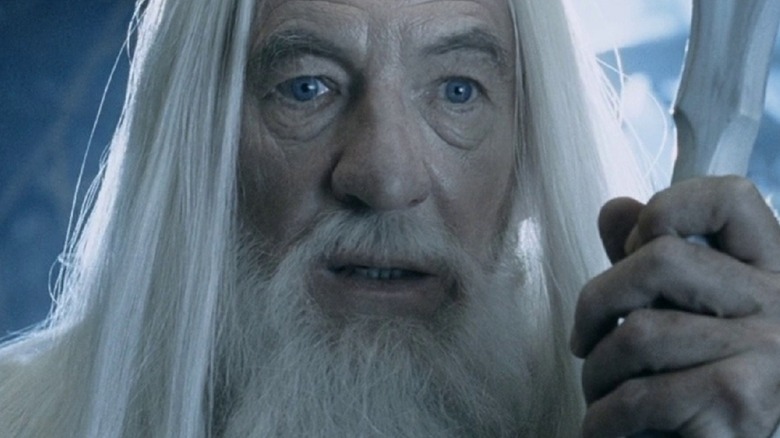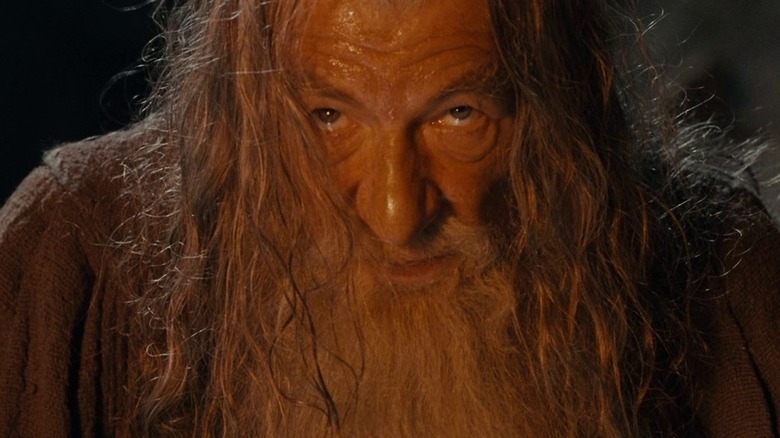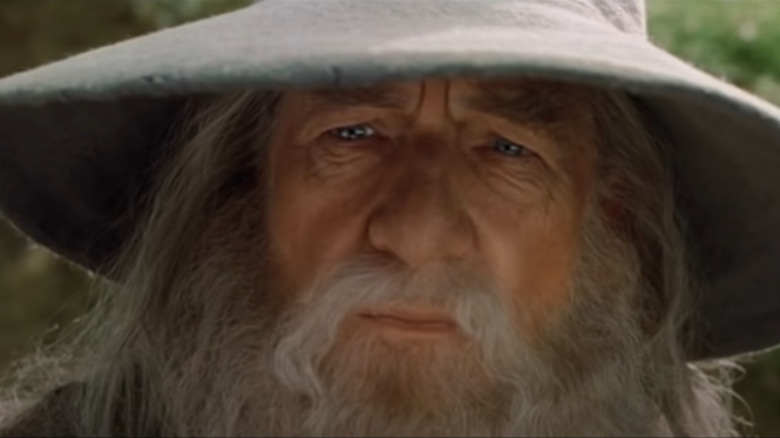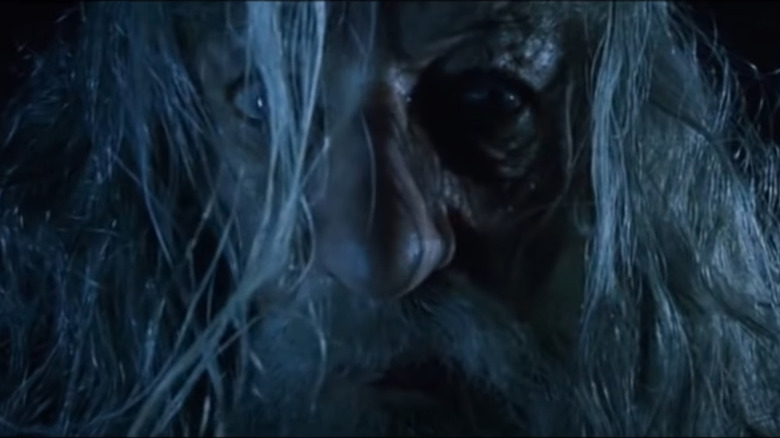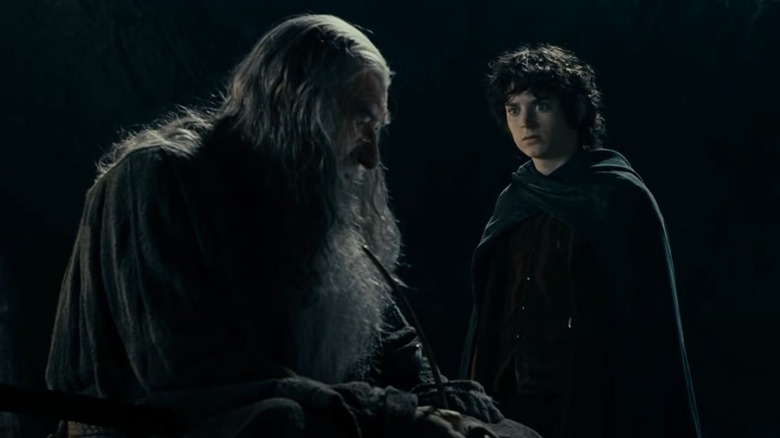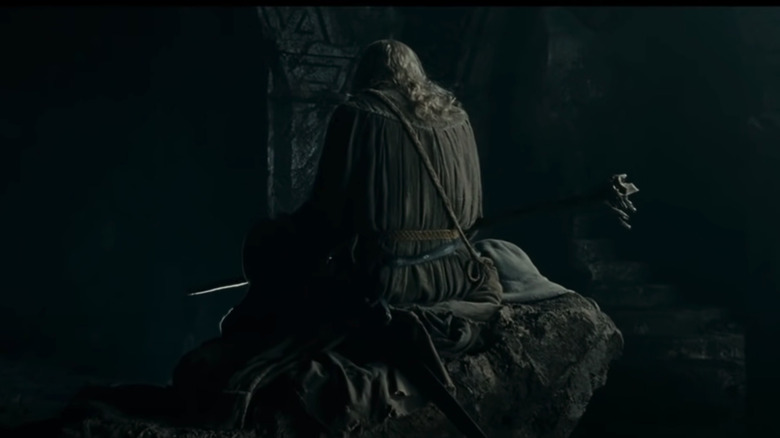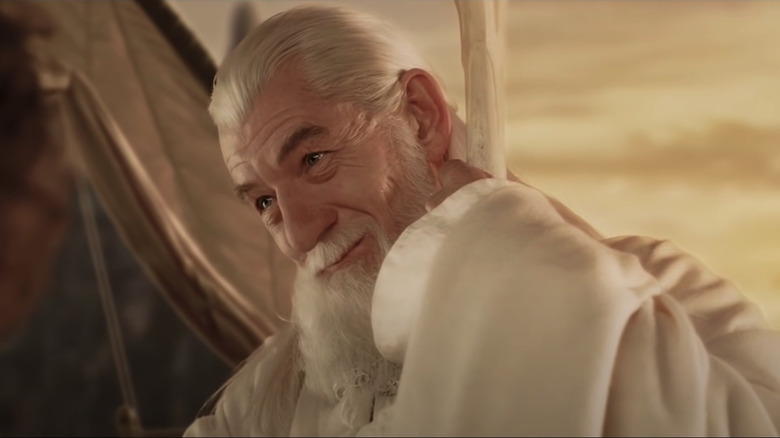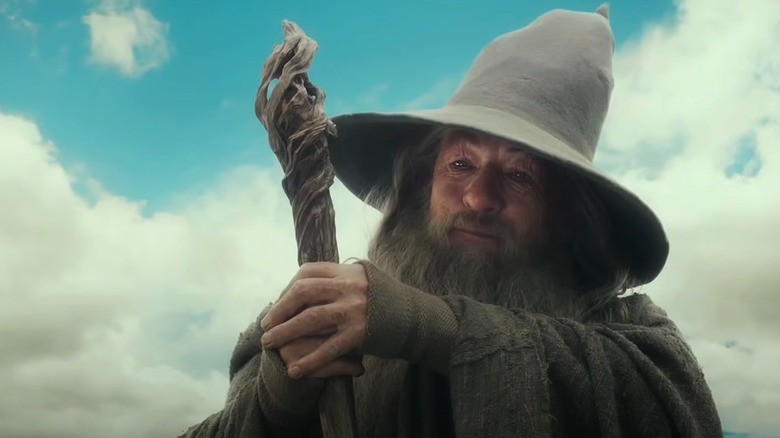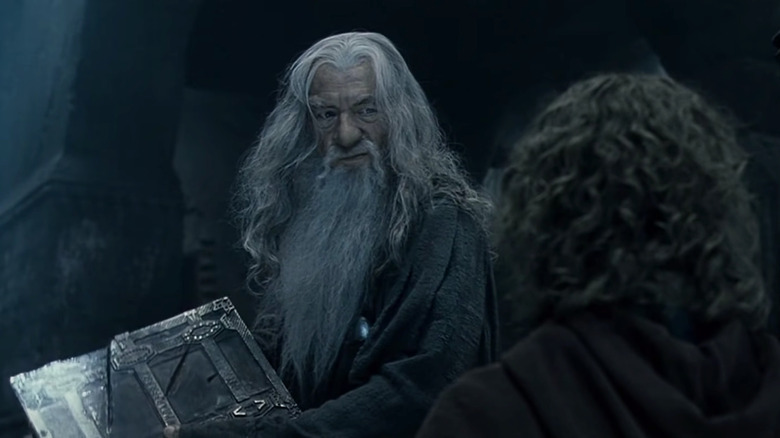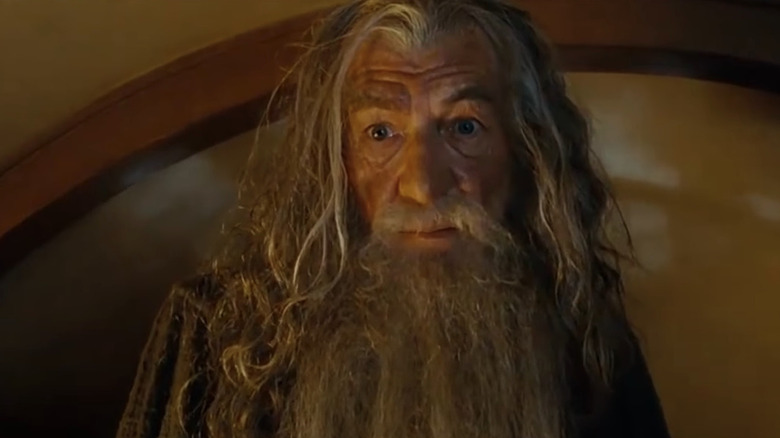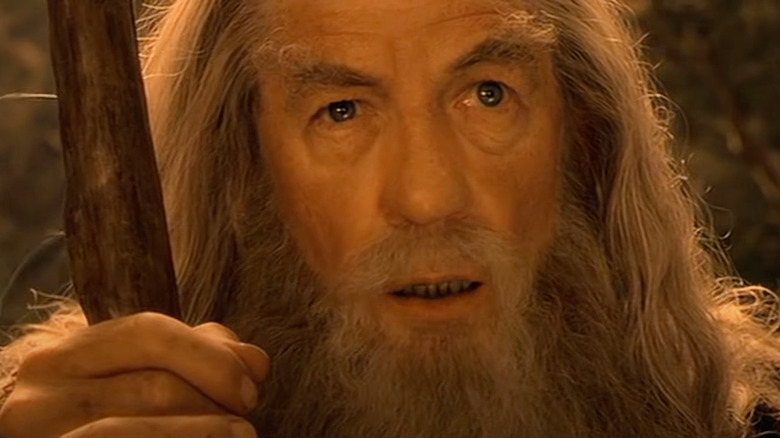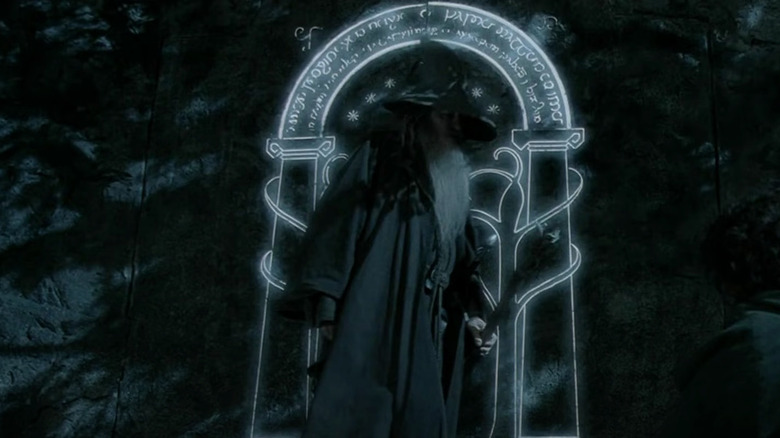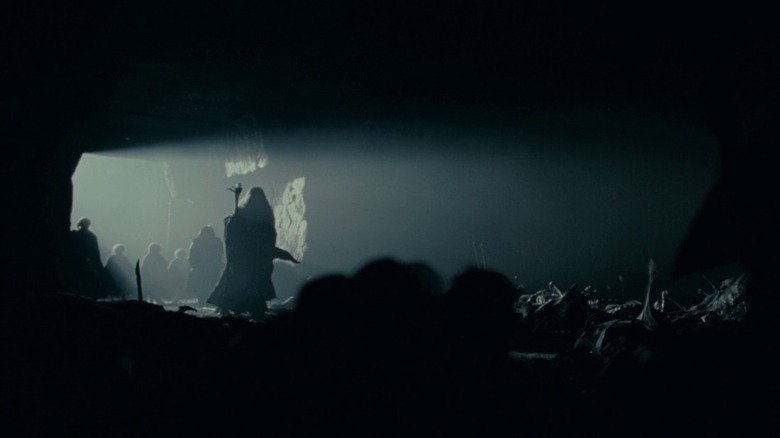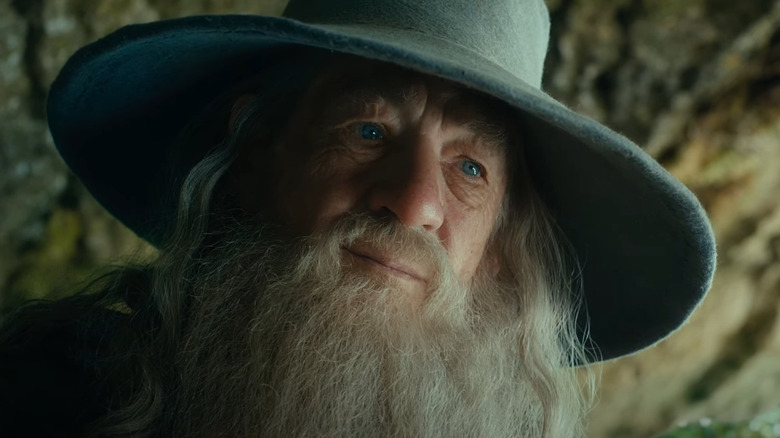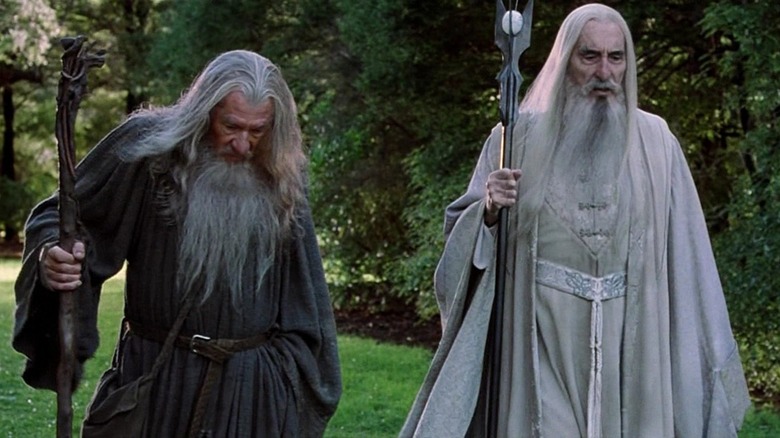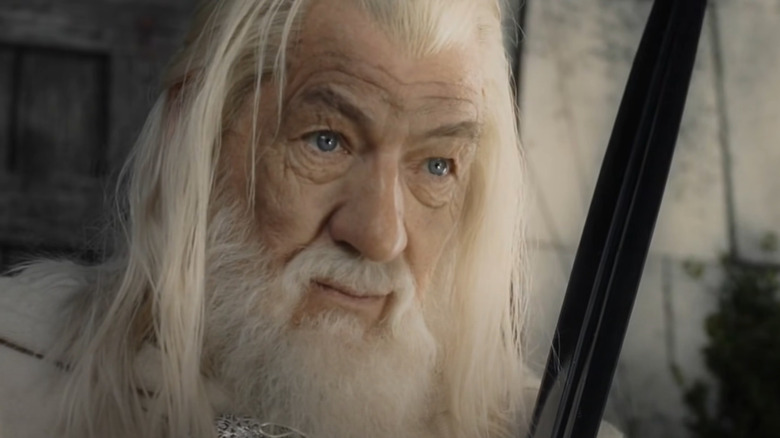Most Memorable Gandalf Quotes Of All Time
J.R.R. Tolkien included a lot of different characters in his Middle-earth mythology, and there are few (if any) that are better known than Gandalf. Originating as the angelic Ainur Olórin, eventually the character is bundled up into a wrinkly old-man body and shipped off to Middle-earth to help orchestrate the resistance to the Dark Lord Sauron.
During this part of his life, he's known by many names, including Gandalf the Grey and Gandalf the White. He wanders around Middle-earth, busying himself in everyone's business to the greater good of all. This is summed up in "The Return of the King," when Gandalf tells Denethor, the steward of Gondor, "The rule of no realm is mine. ... But all worthy things that are in peril as the world now stands, those are my care. And for my part, I shall not wholly fail of my task ... if anything passes through this night that can still grow fair or bear fruit and flower again in days to come."
The best part of Gandalf's worldwide safety commission is that the wizard isn't afraid to speak his mind as he helps everyone around him. In fact, the wizened fellow drops one gem of a line after another, from Mirkwood to Gondor and everywhere in between. This has left a lot of great quotes over time. We've gone through the annals — both printed and cinematic — and pulled out the best Gandalf quotes to date. Here they are, in no particular order, in all of their grey-bearded glory.
You cannot [shall not] pass
There are several quotes that Gandalf utters that have become deeply embedded within the Tolkien experience, but there are a couple that spring to mind particularly quickly, including his three- or four-word declaration (depending on what version you're counting) on the ancient bridge of Khazad-dûm. As the Balrog approaches the slender bit of stone scaffolding, Gandalf places himself squarely between the fiery demon and his friends on the other side of the yawning gorge.
In Peter Jackson's movie "The Fellowship of the Ring," the following confrontation ends with the wizard shouting, "You shall not pass!" And then he bravely smites the bridge and sends his enemy into the abyss below. The original book version plays out very similarly with the exception that Gandalf actually says, "You cannot pass!"
Either way, the scene is dripping with spine-chilling drama. For those experiencing the story for the first time, it's also followed by the devastating moment when it appears that the hero falls to his death — though not before uttering his snappy follow-up line, "Fly, you fools." The scene is one of the best that Tolkien ever penned, as well as one of the greatest book-to-screen scene adaptations of all time. It also provides a nifty one-liner that fair-weather fans and diehard Tolkien junkies alike love to recall at will for all sorts of occasions.
A wizard is never late...
Along with "you cannot/shall not pass," Gandalf's other most oft-repeated phrase comes even earlier in the "Fellowship of the Ring." When the wizard arrives in the Shire shortly before Bilbo's 111th birthday party, Frodo greets him with a saucy reminder that he's late. The wizard's humorously snarky reply is, "A wizard is never late. Nor is he early. He arrives precisely when he means to." The line is followed by an eruption of laughter as Frodo launches himself into Gandalf's wagon and the two friends head toward Bag End.
The words resonate with fans not just because they're clever. They also perfectly sum up Gandalf's mysterious goings and comings. In fact, after Bilbo's party, the wizard doesn't come to the Shire again for three years. Even after that, it says in "The Fellowship of the Ring" book that "he "turned up fairly often, coming unexpectedly after dusk, and going off without warning before sunrise."
The best part of this Gandalf quote, though, is the simple fact that it isn't even one that Tolkien penned. In one of the rare instances where an adaptation seamlessly fits in with its source material, it turns out that it was scriptwriter Philippa Boyens who wrote the line. In fact, in a Zoom interview with Josh Gad, she explains it's one of the first things she ever wrote for Jackson's movies, and she suspects it's how she landed her prestigious role as part of the massive production.
Keep it secret
Gandalf begins to suspect that Bilbo and Frodo's quaint magic ring is the One Ring long before he confirms that fact. With that in mind, when he goes to leave the Shire after Bilbo's party in the book "The Fellowship of the Ring," he gives the new Ring-bearer a bit of friendly advice, saying, "I should not make use of it, if I were you. But keep it secret, and keep it safe!" Of course, the wizard just wouldn't be himself if he didn't follow this up with the line, "Now I am going to bed."
This wise warning helps Frodo start his time with the One Ring on the right footing. Rather than using it for clever disappearing tricks, like Uncle Bilbo, he always keeps it on its chain, unused. In the book, Gandalf commends this wisdom when he returns to the Shire nearly two decades later. However, in the movie version, the writers use both Gandalf's departure and his return as ways to weave the original quote into the script in a slightly different way.
When he leaves Bag End, he does tell Frodo to put the ring "somewhere out of sight" and "keep it secret, keep it safe." But it goes further. When he comes back to Bag End, he surprises Frodo one night, coming up to him from behind and urgently asking, "Is it secret? Is it safe?" Whether as a word of warning or a desperate question, the quote has become one of Gandalf's most oft-repeated lines of all time.
What to do with the time that is given us
Most of Gandalf's lines are all about business. From taking down the Balrog to instructing Frodo on how to protect the One Ring, the wizard is always thinking 10 steps ahead and using that wisdom to help others around him. But every once in a while, the old man will focus on a specific individual and give them some really personal advice. Case in point — when Frodo expresses his overwhelmed shock at the fact that Sauron has returned.
In the book "The Fellowship of the Ring," when Gandalf explains to Frodo that Sauron is a threat to the world once again, the hobbit disappointedly says, "I wish it need not have happened in my time."
In that moment of doubt and fear, Gandalf steps up to the plate — not as a stern counselor focused on geopolitics but as a friend of a small, scared hobbit. In this very different role, he says, "So do I ... and so do all who live to see such times. But that is not for them to decide. All we have to decide is what to do with the time that is given us." The movie version of the line is slightly different and comes not once but twice — first when the two characters are talking in Moria and again at the end of the movie. Either way, the effect is the same. It's these little moments of compassion and encouragement that round Gandalf out as a character and endear him to the fans so much.
Many that live deserve death
Gandalf is a character who can deliver a dose of sobering wisdom at the drop of a pointy hat. More than once, when the people around him get emotional, the wizard makes a statement that puts everything into perspective. It's the kind of thing that only an immortal spiritual being can really do with truly great effect. One of the best moments when this happens comes in "The Fellowship of the Ring," when Frodo expresses a panicky hatred toward Gollum for stirring up all of this Ring business, declaring that he "deserves death," and wishing Bilbo had finished him off years ago.
In response, Gandalf says, "Deserves it! I daresay he does. Many that live deserve death. And some that die deserve life. Can you give it to them? Then do not be too eager to deal out death in judgment." The wizard goes on to point out that even the wise cannot see every eventuality, prophetically adding that Gollum's fate is still tied to the Ring. He even says, "My heart tells me that he has some part to play yet, for good or ill, before the end; and when that comes, the pity of Bilbo may rule the fate of many — yours not least."
Again, this line is altered in the movie and takes place in Moria, rather than Bag End, but it has a similar impact on the audience. It's these prescient moments (again, altered but just as powerful in Jackson's movies) that drive home Gandalf's ancient experience and venerable wisdom.
I will not say 'do not weep'
Gandalf's quotable content comes early and often throughout his Middle-earth tenure ... and they keep on going right until the last moments before he leaves the continent, headed for the Blessed Realm across the sea in the West. In fact, in "The Return of the King," during the last few lines of the book, the wise wizard drops one of his best quotes of the whole story.
The memorable statement in question comes when Frodo, Sam, Merry, Pippin, and Bilbo arrive at the Grey Havens. Galadriel, Elrond, and Gandalf are there too, and they board a ship along with Frodo and Bilbo to literally sail off into the sunset. But right before they do so, Gandalf says goodbye to the hobbits left behind, telling them, "Go in peace! I will not say: do not weep; for not all tears are an evil."
The words are great all on their own, but they take on a whole new meaning when they're juxtaposed against the story that's about to finish. There is so much pain and suffering throughout "The Lord of the Rings," and here at the end, even in victory, the elves are still losing their home as they fade away into the West. And yet, as Tolkien ends his book, he tosses in this line, reminding everyone that it's still okay to cry when you're feeling all the feels.
Do you wish me a good morning?
Gandalf is one of the most consistent characters in all of "The Hobbit" and "The Lord of the Rings" stories. In fact, his presence is there from one end of the story to the other. No, literally. In fact, he's right there on the last page of "The Return of the King," and the first time we ever see him is when he walks onto the first few pages of "The Hobbit" and bumps into a much younger Bilbo blowing smoke rings in front of Bag End.
The conversation that follows this initial meeting is witty, humorous, and sets the entire tone of childlike wonder that has made the book a favorite since it was written. That said, there's one line during the discussion that stands out as particularly quotable — at least, as far as inadvertent tongue twisters are quotable.
When Bilbo offers Gandalf a cheery "good morning," the wizard's saucy response is, "What do you mean? Do you wish me a good morning, or mean that it is a good morning whether I want it or not; or that you feel good this morning; or that it is a morning to be good on?" This nonsensical reply is very unlike the Gandalf that we get to know later in "The Lord of the Rings." Nevertheless, for a character who's usually on the scene because the situation is really serious, it's fun to see Gandalf let down his hair and mess with Bilbo's head a bit when things are going slow and he isn't trying to, you know, save the world and stuff.
Fool of a Took!
At the beginning of "The Fellowship of the Ring," Gandalf tells Frodo that among the Wise, he's the only one that "goes in for hobbit-lore," referring to it as an obscure brand of knowledge that is full of surprises. Later on in the book, the wizard reveals some of his unusually solid hobbit trivia when the Fellowship of the Ring is traveling through Moria.
At one point during this trip, Pippin gets a little too nosy (in the books, he drops a stone into a deep well out of curiosity, while in the movie, he knocks a delicately balanced skeletal corpse down a similar stone shaft). The resulting sound causes everyone to go on the alert. This leads to a snarky response from Gandalf. In the movie, he simply says, "Fool of a Took! Throw yourself in next time and rid us of your stupidity."
In the book, the line is a little longer. It goes, "Fool of a Took! This is a serious journey, not a hobbit walking party. Throw yourself in next time, and then you will be no further nuisance. Now be quiet!" Either way, the reference to a "foolish Took" is Gandalf subtly digging at Pippin's well-established family tradition of being the most famous family of adventurous troublemakers in all of hobbit culture. Even in stressful moments, the wizard knows how to craft a biting remark.
One Ring to rule them all - Part One
Everyone and their mother is familiar with the Ring Verse. It's that "three rings for the elven-kings" poem that forms a central thesis for the entire "Lord of the Rings" story. It's also an integral bit of poetic lore for Amazon's "Rings of Power" series, so much so that the show's title reveal featured Morfydd Clark's Galadriel speaking the first half of the poem.
If you dig around in the books, though, there's one character who's particularly connected with reciting that poem (or at least part of it) in-story, and it's not Galadriel — it's Gandalf. In fact, the time and place of his recitations — he speaks it twice in two very different ways — are so epic that both of them make the most memorable list.
The first time he utters the phrase takes place in Bag End, when Frodo and Gandalf see the two lines of the Ring Verse appear on the sides of the heated Ring. At that point, Gandalf tells his hobbit companion that they're written with Elvish letters, but they're in a language of Mordor, which he won't speak out loud at the time. Instead, he pronounces them in the Common Tongue, moodily stating, "One Ring to rule them all, One Ring to find them, One Ring to bring them all and in the darkness bind them." The line is unsettling, and he follows it with the complete version of the poem before informing Frodo that he's had the One Ring all of this time ... oh, and Sauron really wants it back, like really a lot. Yeah...
One Ring to rule them all - Part Two
Gandalf delivers the "One Ring to rule them all" line twice in "The Fellowship of the Ring." The first time comes in Bag End and is spoken in the Common Speech of Middle-earth. But the second one comes during the Council of Elrond, and it's a bit more dramatic.
As the members of the Council get up to speed regarding the Ring and debate about what to do with it, Gandalf finds that he needs to yet again remind everyone present about what's written on the side of the little golden trinket. In the movie, this comes right before Boromir reaches out to touch it. In the book, the line is spoken when Gandalf reports what Isildur recorded after he cut the Ring from Sauron's hand. In either case, the words are the same: "Ash nazg durbatulûk, ash nazg gimbatul, ash nazg thrakatulûk, agh burzum-ishi krimpatul!"
This bunch of nonsense letters is the Black Speech of Mordor that the wizard refused to pronounce unnecessarily in the comfort of Bag End. Instead, he saves the discomforting declaration for the Council and delivers it in convincing style. It casts a shadow on the meeting, and the elves freak out when they hear the language of their ancient enemies. While the Council goes on from there, it's a dramatic disruption that sets the tone for the decision to destroy the Ring.
Absurdly simple
This quote is one that only those who have read "The Fellowship of the Ring" will recognize ... at least, coming from Gandalf. In Peter Jackson's adaptation, it's Frodo who guesses the password to get into Moria. However, in Tolkien's original text, it's none other than Gandalf who remembers the word.
After spending a long while trying countless variations of passwords and even using multiple languages to do so, the wizard throws his staff on the ground and sits down in frustration. Then, a bit later, he suddenly jumps up, laughing, and says, "I have it! Of course, of course! Absurdly simple, like most riddles when you see the answer." He then declares the one word "mellon" — the Elvish word for "friend" — and, presto, the doors open.
The scene shows a rare side of Gandalf, as the wizard is genuinely stumped by his failure to remember the password. Using all of his knowledge and cleverness doesn't work one bit, and it isn't until he steps back and looks at the situation in a simpler, friendlier way that he sees the innocent truth.
Always follow your nose
Gandalf knows a lot of stuff. By the time of "The Lord of the Rings," he's spent millennia wandering around Middle-earth, and that doesn't even take into account his earlier life as an angelic Ainur. But every once in a while, he's stumped by a problem. The gates of Moria nearly trick him, but he manages to figure out the riddle before the Watcher in the Water can turn Frodo into a snack. But before the Fellowship can get to the other side of the mines, the wizard faces yet another tricky situation — and this time, he straight-up cannot think of the answer.
When the group comes up to a three-way passage, Gandalf fails to remember which one leads them to their destination. He spends a lot of time thinking about it and finally makes a decision. In the book, he gives a less memorable breakdown of his choice, explaining that one passage doesn't "feel" right and the other one smells wrong, adding, "There is foul air down there, or I am no guide."
In Jackson's movie rendition, this explanation is shrunk and retooled into one of the few lines that are actually more memorable than what's in the original book. Gandalf picks a passage, and when Merry says that "he's remembered," the Grey Wanderer's response is, "No. But the air doesn't smell so foul down here. If in doubt, Meriadoc, always follow your nose." It's great advice and an instant classic to boot.
When to spare a life
Shortly after Bilbo and his companions survive the encounter with the trolls in 2012's "The Hobbit: An Unexpected Journey," Gandalf gives the titular hobbit his short sword, Sting. When Bilbo doesn't want to accept the violent weapon, the wizard insists that he keep it, adding the caveat that, "True courage is about knowing not when to take a life but when to spare one."
The line is a little clunky for a Tolkien story, but it gets the job done, inspiring Bilbo to spare Gollum's life not long afterward. While it doesn't have a direct connection to the books, if we had to guess, we would find the inspiration for this sentence in "The Fellowship of the Ring," when, long after the fact, Gandalf recollects Bilbo's act of mercy after he escaped the clutches of a vengeful Gollum.
At that much later date, he says, "It was Pity that stayed [Bilbo's] hand. Pity, and Mercy: not to strike without need." The wizard adds that Bilbo has been well-rewarded for the deed too, saying, "Be sure that he took so little hurt from the evil, and escaped in the end, because he began his ownership of the Ring so. With Pity." In fact, in the movie version of the book, the wizard says a similar line when Frodo first spies Gollum in Moria. Whether it's these remembrances or a prophetic word of wisdom, Gandalf's grasp of the importance of pity is definitely something that helps define his Middle-earth career.
He that breaks a thing
When Gandalf visits (and is subsequently captured by) Saruman in "The Fellowship of the Ring," the two wizards talk for a bit before Gandalf discovers that his compatriot has officially become a traitor. As the discussion unfolds, the topic of Saruman's past title of "the White" comes into play. Instead of his old name, Saruman declares himself to now be "Saruman, the Wise, Saruman Ring-maker, Saruman of Many Colours!" (Gotta love that British spelling, right?)
After this, Gandalf just responds, "I liked white better." Saruman derisively points out that white things — like cloth or pages — don't last and can be dyed or destroyed very easily, to which Gandalf points out that they are then no longer white. Then he adds the kicker, "And he that breaks a thing to find out what it is has left the path of wisdom."
The line is already juicy enough on its own. But knowing that Gandalf isn't speaking to a silly hobbit or foolish dwarf but to the head of his own order of wizards makes it pack that much more of a punch. Of course, in retrospect, outsmarting Saruman in wordplay about his new title probably wasn't the best move at the time, considering the fact that the dude had a huge army, like, right outside.
Death is just another path
In "The Return of the King" film, there's a point when Gandalf and Pippin are trapped with a remnant of Gondorian soldiers in a Minas Tirith that's about to fall to Sauron's armies. As Pippin looks worried about his apparently approaching doom, Gandalf points out, "Death is just another path. One that we all must take."
The memorable line is a little cheesy, but it hits home at that particular moment. Then Gandalf starts to nonsensically spout off some geographic descriptions, stating that, "The grey rain curtain of this world turns back, and it all turns back to silver glass. And then you see it ... white shores and beyond, a far green country under a swift sunrise."
For anyone new to Middle-earth, this may seem odd. However, it turns out that the writers lifted the line from the end of "The Return of the King" book. In the printed version, Frodo sails off into the West, and the last line we get about him describes what he sees when he arrives. Guess what it says? "The grey rain-curtain turned all to silver glass and was rolled back, and he beheld white shores and beyond them a far green country under a swift sunrise." Yup. In the book, turns out the line isn't about death but about arriving in immortal Valinor in the West. Still, the whole bit about death being another path is still valid, and it makes a good quote too.
